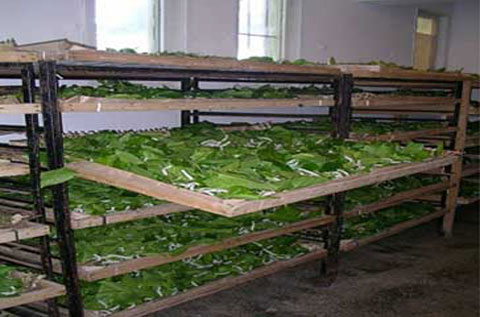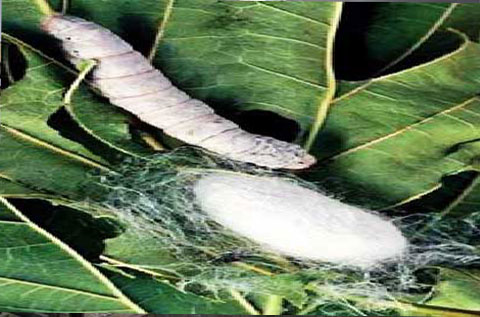Training and Business Development in Sericulture (Silk Production) for Poor Women from Village
In India, Sericulture is essentially a village-based industry providing employment to a sizable section of the population. Although Sericulture is considered as a subsidiary occupation, technological innovation has made it possible to take it up on an intensive scale capable of generating adequate income. It is also capable of providing continuous income to farmers.
India is the second largest producer of silk in the world. Among the four varieties of silk produced, in 2015-16, Mulberry accounts for 71.8% (20,434 MT), Tasar 9.9% (2,818 MT), Eri 17.8% (5,054 MT) and Muga 0.6% (166 MT) of the total raw silk production of 28,472 MT. All the known varieties of silk, viz. Mulberry, Eri, Muga and Tasar are produced in India. Mulberry silk is the most popular variety in India, contributing more than 70% of the Country's silk production. Silk and silk goods are very good foreign exchange earners. Export potential of this sector is promising as silk production in Japan is declining and that of China, the largest silk production in the World, it is stagnant or declining.
In India, because of the prevalence of favourable climatic conditions, mulberry is cultivated mainly in five states, viz., Karnataka, Andhra Pradesh, Telangana, Tamil Nadu, West Bengal and Jammu & Kashmir. These five states collectively account for 97% of the total area under mulberry cultivation and 95% of raw silk production in the country. Now, as a result of growing realization, Sericulture is gaining ground in non-traditional areas too. Most of the silk produced in the country is from multi x bi hybrids which is inferior in quality and cannot meet the international standard as well as the domestic needs of the power loom sector. Majority of the silk produced in India is consumed for producing sarees mainly on handlooms. Bivoltine silk excels in quality and is mostly produced in country having temperate climate. Hence the power loom weavers prefer imported superior quality silk.
The present global scenario clearly indicates the enormous opportunities for the Indian Silk Industry. The need of the hour is to produce more bivoltine silk with reduced cost of production to meet the growing demands of quality silk. Realising this, the Govt. of India is taking all efforts to boost bivoltine production in the country.
The main Research & Training Institutes of the Central Silk Board (CSB) provide scientific and technological support for enhancing production and productivity for sustainable sericulture through innovative approaches. The main institutes at Mysore (Karnataka) Berhampore (West Bengal) and Pampore (J&K) deal with Mulberry sericulture whereas Ranchi (Jharkhand) deals with Tasar culture and Lahdoigarh, Jorhat (Assam) deals with Muga and Eri culture. Regional Sericulture Research Stations (RSRS/RTRS/RMRS) for Mulberry and Vanya sericulture have been functioning for the development of region specific technology package and dissemination of research findings as per regional needs. Besides, a network of Research Extension Centre (RECs) & its sub units for mulberry and vanya silk are also functioning to provide extension support to sericulturists.
In order to provide R&D support in post cocoon sector, the Board has established a Central Silk Technological Research Institute (CSTRI) at Bangalore. In addition, the CSB has also set up Silkworm Seed Technology Laboratory (SSTL) in Bangalore (Karnataka), Central Sericultural Germplasm Resource Centre (CSGRC) at Hosur (Tamil Nadu) and SeriBiotech Research Laboratory (SBRL) at Bangalore.
During the year 2015-16, up to the end of March 2016 a total of 55 new research projects have been initiated and 38 projects have been concluded by various R&D institutes of CSB and currently a total of 116 research projects viz., 80 in Mulberry Sector, 20 in Vanya Sector and 16 in Post cocoon sector are under progress.
Apart from Central Sector Schemes, CSB has also been supporting the State Governments in implementing a Centrally Sponsored Scheme viz Catalytic Development Programme (CDP) with an aim of synergizing and disseminating improved technology packages, innovations developed by its R & D units and incentivizing investments among the stakeholders to adopt improved technology leading to enhanced production, productivity and improvement in quality of silk so as to enhance the income of primary producers.
Pipal Tree Skill Ventures Pvt. Ltd (PTSVPL) taken the initiative to start the Sericulture in its premises by planting the Mulberry plants in about 2 acres of land with rearing shed and production of silk worms and to impart the training to the rural women. As this requires low investment and farming in the rural areas with an aim to empower the women in the villages. This will improve support from the Govt. The technical assistance will be provided by the Pipal Tree to promote the production of silk which will automatically enhance the livelihood of women who can earn a handful income. Pipal Tree facilitating them by providing technical support and training. In this regard Pipal Tree started extensive survey into the villages and started collecting the information from the village women those are interested to start the unit. The women who are mobilized from poor families in villages will be given residential training at our training centers. The training includes.
Regular skill based training classes, site visits, workshops, etc.
Basic computer skills and soft skills.
Classes by executives and counseling by employers.
After completion of this, the women are capable of producing good quality of silk as well as become a part of the production of silk in India. This will enhance their livelihood in their villages. Apart from the production of silk the women will be provided with good marketing support to sell the raw silk in the market.


 PIPAL TREE SKILL VENTURES
PIPAL TREE SKILL VENTURES
 PIPAL TREE SKILL VENTURES
PIPAL TREE SKILL VENTURES

